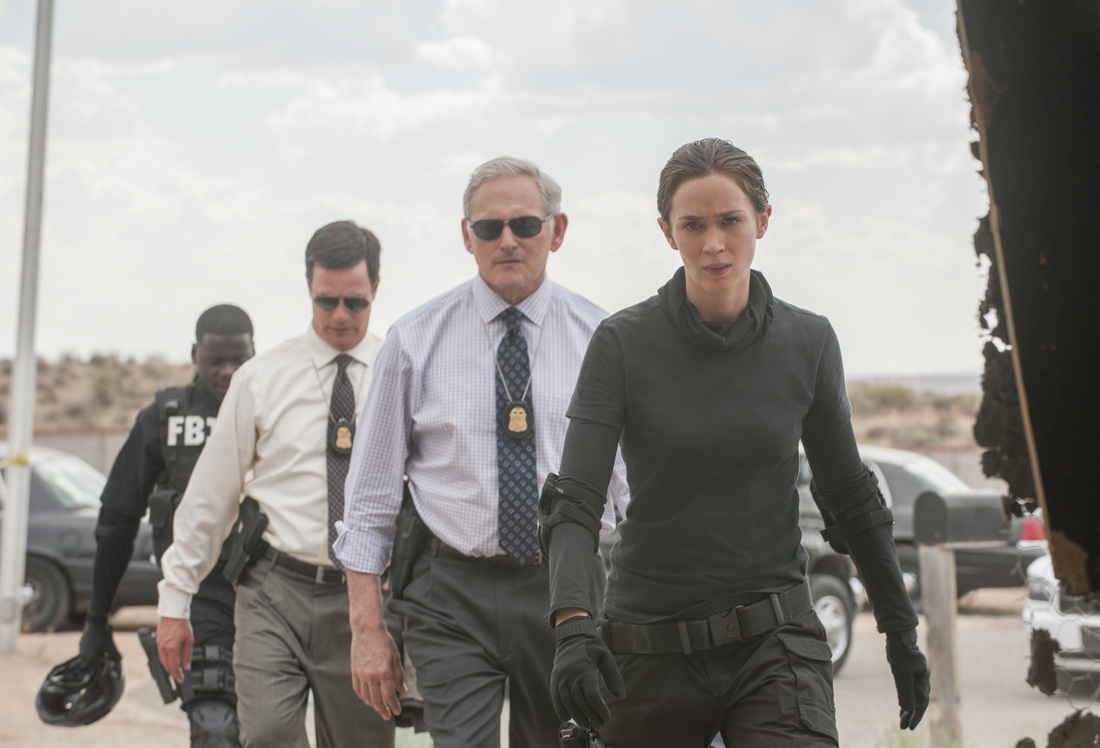Except the people she’s working for take her to Juarez, Mexico instead of the promised El Paso, Texas and she’s dropped directly into the drug wars. From there, Kate loses all control and is as blind as the audience when it comes to what she is now a part of. The two men who overlay her face on the poster grab the reins and leave all information barred and it becomes harder to trust anything you hear. Department of Defense consultant Matt, played by Josh Brolin and his haughty smirk, wears flip-flops to government agency meetings and works alongside his mysterious acquaintance, Alejandro, played by Benicio Del Toro. The two make a stellar #TrueDetectiveSeason3 team as they manipulate Kate and audience alike in one dynamic set piece after another.
Which returns me back to the poster: a pensive Kate controlled by Matt and Alejandro who dominate her headspace. The decision to introduce Kate as the poster strong female war hero only to then push her off to the side as if she’s irrelevant is Machiavellian and brilliant. Her brave character traits are shown as useless among these operatives as Sicario ridicules expectations while still exciting audiences for the next moment. It has complete control of suspense, a feat that director Denis Villeneuve is no rookie at (see: Enemy, Prisoners). Every scene feels meditative, with guns firing like fireworks that soundtrack every shot. The score by Jóhann Jóhannsson (The Theory of Everything) competes with the gunshots and elevates the blood pressure with his demanding and perfectly timed sound. Visually, Villeneuve excels again with moral blue lighting dominating any shots Kate is in against the dusty, ochre lighting casted over everything else.
What really makes me think after seeing Sicario is not it’s technical and acting achievements, but it’s exploitation of the drug wars and the U.S. government. It’s a topic so cloudy in the minds of Americans because every act to intervene seems futile. Villeneuve isn’t afraid to show the gruesome, bloodied wreckage of what happens there every day, even describing the daily gunfire as “the Fourth of July on steroids.” Mutilated bodies hang from bridges, children are dropped into vats of acid (not shown, don’t worry), families are murdered in front of each other; it’s a terrifying world best shown through Villeneuve’s ghastly lenses. He also capitalizes on the ethical aspect of revenge, the part that makes you think “sure it feels good, but is it really the right thing to do?”, by having Kate and Alejandro’s morals battle each other, only for the one with the loaded gun against the other’s jaw to win. The end of the movie forces you to question who’s really on the “good guy” side of these drug wars and who’s really responsible for the ongoing drug cartels dominating and killing Mexicans. It’s an extremely appropriate way to depict the issue because of how it allows the audience to actually think about what’s going on over there instead of getting them fascinated with all the shooting and then leaving the theater vacuously.
Sicario is unconventional and great because of it. Blunt, Del Toro, and Brolin deliver stellar performances on top of a beautifully shot thriller that contains a good combination of politics and action. I haven’t even begun to discuss the movie’s cartel family subplot or it’s portrayal of Mexicans and whether it’s stereotypical- Sicario is a lot to unravel. In a scene where Kate asks Alejandro why they’re in the midst of the cartel wars, he philosophically answers “You're asking me how a watch works. For now, just keep an eye on the time.” By the movie’s end, she learns how this operation works: it simply doesn’t.
Grade A

 RSS Feed
RSS Feed
